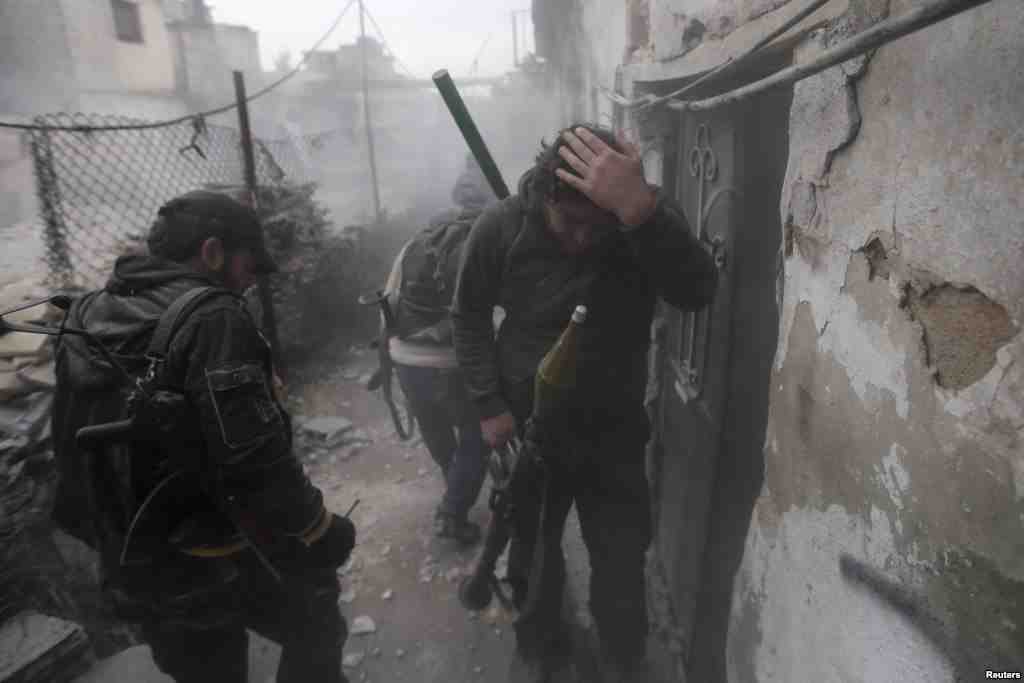Syrian activists: Barrel bombs kill up to 2,000 in Aleppo
Crude bombs dropped by Syrian government forces on opposition-held parts of the northern city of Aleppo have killed nearly 2,000 people so far this year, an activist group said on Friday.
The grim figure is the latest addition to the deadly tally from Syria’s civil war, which has killed more than 162,000 people, according to activists. The crude bombs — known as barrel bombs — are shrapnel-packed explosive devices that Syrian forces have been rolling out of helicopters over opposition-held neighborhoods.
The Britain-based Syrian Observatory for Human Rights — one of the main groups counting the dead in the three-year-long conflict — said Friday there were 1,963 deaths in 2014 from barrel bombs in Aleppo, including 283 women and 567 people under the age of 18.
According to the Observatory, 14 people are dying on average every day in Aleppo because of the barrel bombs. The containers, or barrels, are usually packed with hundreds of kilograms (pounds) of explosives as well as scraps of metal and are intended to cause massive damage on impact.
A UN Security Council resolution adopted in February demanded, among other things, a halt to all attacks on civilians in Syria and indiscriminate shelling and aerial bombardment, including the use of barrel bombs in populated areas.
In March, the New York-based Human Rights Watch said it used satellite imagery to identify at least 340 places in opposition-controlled areas of Aleppo that were damaged between early November and Feb. 20. The majority of the sites bore signatures of damage consistent with barrel bombs, it said.
Cross-border aid into Syria
In the meantime Australia, Luxembourg, and Jordan are planning to circulate a new UN Security Council resolution that diplomats say would authorize the delivery of humanitarian aid into Syria through four border crossings without approval from President Bashar Assad’s government.
Australia’s UN Ambassador Gary Quinlan told reporters after a council briefing Thursday on the humanitarian crisis that 90 percent of aid currently “goes to government-held areas,” and Syrians in opposition-controlled zones aren’t getting food and medicine.
Quinlan said the resolution, which will be circulated “very quickly,” will respond to Secretary-General Ban Ki-moon’s call for council action, but he gave no details.
Diplomats familiar with the draft said it is under Chapter 7 of the UN Charter, which means it could be enforced militarily. It would authorize humanitarian access at two crossings from Turkey, one in Jordan and one from Iraq helping more than 2 million people who have not received aid. The diplomats spoke on condition of anonymity because the draft has not been made public.
All 15 council members voted for a resolution in February demanding that all sides in the Syrian conflict allow immediate access for aid. UN officials have said the resolution has failed to change the dire humanitarian situation.
Currently, all UN aid must go through Damascus — a practice which UN humanitarian chief Valerie Amos has repeatedly criticized.
The February resolution mentioned “further steps” if its demands weren’t met, but Russia, Syria’s closest ally, has long opposed any Chapter 7 resolution on Syria. Russia and China have vetoed four resolutions on Syria. Some diplomats doubt Russia would approve a new humanitarian resolution under Chapter 7, but they say it could be a bargaining chip in negotiations.
Quinlan said he wouldn’t speculate on the reaction or Russia or anyone else, adding: “People did in February, and they were wrong.”
Assistant Secretary-General for Humanitarian Affairs Kyung-wha Kang told the council that flagrant violations of international humanitarian law and human rights by all parties in Syria continue, along with the arbitrary denial of assistance to people in need.
“We once again appeal for rapid, unhindered and safe access to every Syrian in need,” she said in excerpts released by her office. “All delivery routes must be made available to us — both cross-line and cross-border.”
An assessment by eight international humanitarian groups working on Syria, obtained by The Associated Press, reported the deteriorating humanitarian situation over the past 30 days, along with an increase in the deliberate targeting of aid workers and restrictions on access by both the government and opposition.


